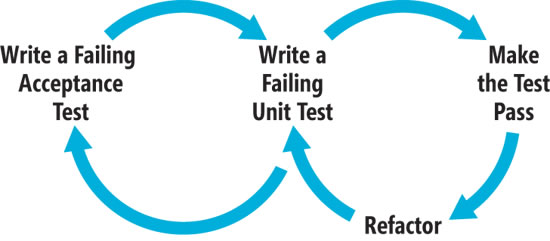I just tried BDD for the first time and implemented a simple Semantic Versioning Bumper in Python.
The class takes a version string in the format of major.minor.patch (i.e. 3.2.2, where major=3, minor=2, patch=2). Then you can bump a level, say patch, and you'd get 3.2.3. If you bump minor, you'd get 3.3.0 and if you bump major, you'd get 4.0.0.
For the BDD, I followed this workflow:

I wrote a high-level features file, then wrote the unit tests and then refactored until everything was working.
My problem is that both the unit tests and the acceptance tests are testing the same things, which doesn't feel right to me, but I don't know where to draw the line.
The code is not too complex so someone who is not too familiar with Python should be able to understand what's going on as well.
I would love to hear feedback regarding the implementation of my tests (or the actual code too, but mainly the tests).
Feature: Bump version strings
Scenario: Increase patch version
Given the version 0.1.2
When we bump patch
Then version is 0.1.3
Scenario: Increase minor version
Given the version 0.1.2
When we bump minor
Then version is 0.2.0
Scenario: Increase major version
Given the version 0.1.2
When we bump major
Then version is 1.0.0
@given('the version {version}')
def step_impl(context, version):
context.versionbump = VersionBump(version)
@when('we bump {level}')
def step_impl(context, level):
context.versionbump.bump(level)
@then('version is {version}')
def step_impl(context, version):
context.versionbump.get() == version
@then('{level} is {number:d}')
def step_impl(context, level, number):
assert context.versionbump.get(level) == number
def test_same_version_after_parsing(vb):
assert vb.get_version() == '2.0.1'
def test_level_access(vb):
assert vb.get_level('major') == 2
assert vb.get_level('minor') == 0
assert vb.get_level('patch') == 1
def test_bump():
vb = VersionBump('2.0.1')
vb.bump()
assert vb.get('patch') == 2
def test_zeroize():
vb = VersionBump('1.2.3')
vb.zeroize_after_level('major')
assert vb.get_version() == '1.0.0'
def test_invalid_version():
with pytest.raises(ValueError):
VersionBump('2.0.1.0')
def test_get_invalid_level(vb):
with pytest.raises(KeyError):
vb.get_level('foo')
def test_bump_invalid_level():
vb = VersionBump('2.0.1')
with pytest.raises(KeyError):
vb.bump('foo')
_LEVELS = ['major', 'minor', 'patch']
_REGEX = re.compile('^(?P<major>[0-9]+)'
'\.(?P<minor>[0-9]+)'
'\.(?P<patch>[0-9]+)$')
class VersionBump(object):
def __init__(self, version):
self.version_info = self.parse(version)
def bump(self, level='patch'):
""" Bump version following semantic versioning rules. """
self.version_info[level] += 1
self.zeroize_after_level(level)
def zeroize_after_level(self, base_level):
""" Set all levels after ``base_level`` to zero. """
index = _LEVELS.index(base_level) + 1
for level in _LEVELS[index:]:
self.version_info[level] = 0
def get(self, level=None):
""" Return complete version string if called with no parameters.
Return value of given level if ``level`` is given.
"""
if level:
return self.get_level(level)
else:
return self.get_version()
def get_version(self):
""" Return complete version string. """
version = '{major}.{minor}.{patch}'.format(**self.version_info)
return version
def get_level(self, level):
""" Return value of given level. """
return self.version_info[level]
def parse(self, version):
match = _REGEX.match(version)
if match is None:
raise ValueError('Invalid version: {}'.format(version))
version_info = {}
for level, number in match.groupdict().iteritems():
if number:
version_info[level] = int(number)
else:
version_info[level] = None
return version_info
